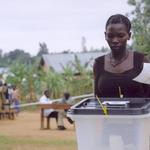Living in a material world: Political funding in electoral authoritarian regimes in Sub-saharan Africa
This thesis investigates the role of political funding in two electoral authoritarian regimes in Sub-Saharan Africa. The issue of political funding has been investigated thoroughly in developed democracies in the West, but only relatively recently have scholars tried to investigate the importance of political funding in Sub-Saharan Africa and in non-democratic regimes who still hold elections. The aim of this thesis is thus to investigate what types of political funding exists in electoral authoritarian regimes in Sub-Saharan Africa, and what contextual factors that affects the availability of funding for different actors. An additional goal is to highlights some of the implications of political funding for the political regime.
The thesis uses three steps to approach this research question. First, it compares and contrasts existing theory on political funding with previous work on issues related to political funding, and builds a theoretical framework based on this. It then turns to case studies of Uganda and Angola using process tracing to conduct a thorough within-case analysis to map out both which funding types exist and the mechanisms and processes surrounding these funding types. Finally, the thesis compares the results of the two case studies in a cross-case comparison and draws tentative conclusions about funding in electoral authoritarian regimes in Sub-Saharan Africa based on this.
The main finding of this thesis is that political funding is an important tool in the authoritarian “toolbox” in electoral authoritarian regimes in Sub-Saharan Africa. The ruling parties in both Uganda and Angola have access to a lot more sources of funding than the opposition parties. Most of the sources that are available to the ruling party and not the opposition parties are linked to their continued electoral dominance and control over state institutions. In general, the findings of this thesis indicates that plutocratic funding and income from graft are the two categories of funding that are most important in the Sub-Saharan African context, and that, on average, the ruling party is able to attract more funding from these funding sources than the opposition. In addition, the thesis highlights that the ruling party in both Uganda and Angola uses its control over the state to deny the opposition possible fundraising sources that they cannot control, but that the approach to this varies between the two regimes. This implies that to fully understand the role of political funding in electoral authoritarian regimes in Sub-Saharan Africa, we need to focus more on the whole funding situation, and not just the way which the ruling parties enrich themselves.

CEIC-CMI Angola Programme (phase 2)






